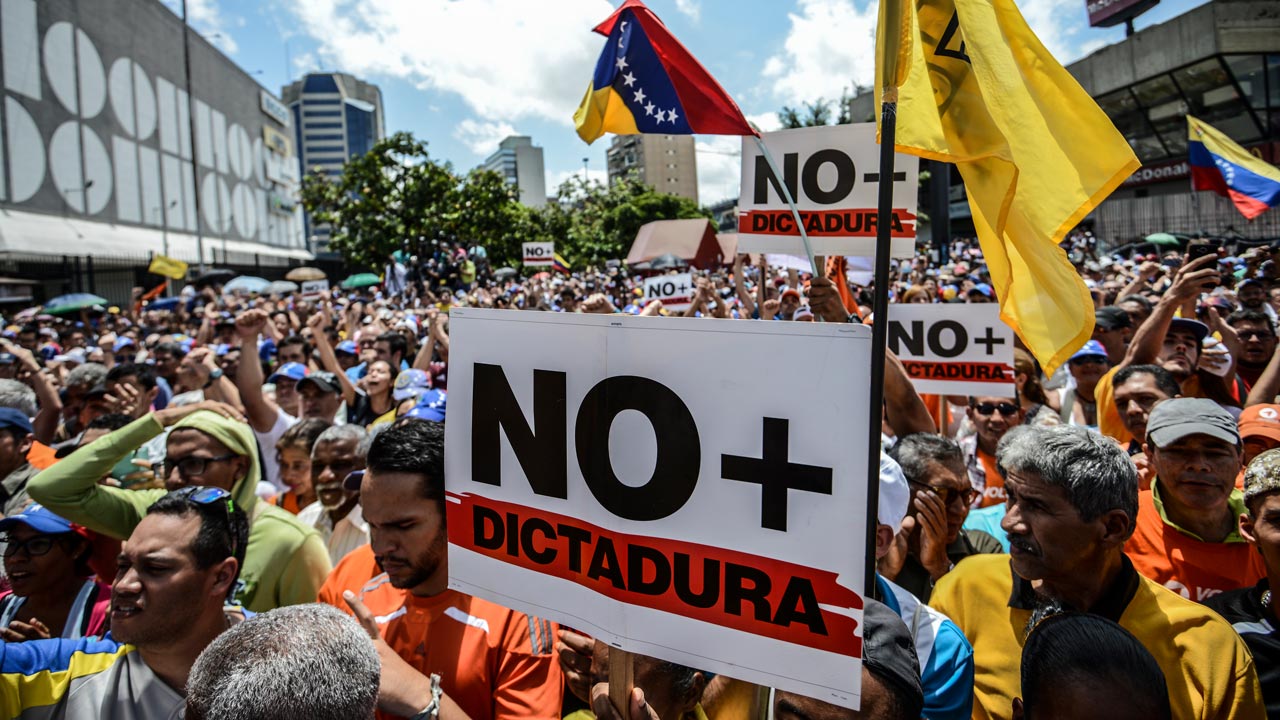
Venezuela’s Supreme Court abandoned measures to seize power from the opposition-controlled legislature after the moves drew international condemnation and raised pressure on President Nicolas Maduro. The president of Venezuela’s National Assembly Julio Borges dismissed the court’s gesture and told reporters that nothing had changed and the coup continued. PHOTO: JUAN BARRETO / AFP
Venezuela’s highest court on Saturday backtracked from efforts to tighten President Nicolas Maduro’s grip on power, after drawing international condemnation that raised pressure on the socialist leader as he clings to office.
In a rare climb-down by the president’s allies, the pro-Maduro Supreme Court retreated from rulings that prompted opposition calls for mass protests in a volatile country stricken by economic and political crisis.
The court said on its website that it was revoking a March 29 decision to take over legislative powers from the National Assembly, a move opponents had angrily branded as a “coup d’etat.”
It also revoked a ruling that stripped lawmakers of their immunity from prosecution. And it ended special powers it had conferred on Maduro over security legislation in the crisis.
Head of the court Maikel Moreno dismissed allegations that its rulings had deprived the legislative branch “of its functions — nor have they dissolved or canceled it.”
In a statement read before representatives of the diplomatic corps, Moreno said the court recognizes assembly “immunity as a guarantee of legislative activity, with limitations” set by the constitution.
– Opposition unconvinced –
Opposition assembly speaker Julio Borges dismissed the court’s gesture.
“Nothing has changed. The coup d’etat continues,” he told reporters.
Opposition groups went ahead with planned street rallies in Caracas on Saturday.
At a gathering of lawmakers on a public square in Caracas, opposition congressional leader Stalin Gonzalez said the assembly should move to suspend the judges.
That would be a difficult task, since it would require support from senior state officials who support Maduro.
“We want general elections, not dialogue,” said retiree Eugenia Salazar, 67, one of hundreds of people who attended the gathering.
The court “violated the constitution by trying to dissolve the parliament. Now they are going back on that, but this is still a dictatorship.”
After the gathering, participants tried to march to the state ombudsman’s office to lobby for his support. They were turned away by riot police who fired tear gas.
– Internal criticism –
Maduro faced the strongest criticism ever from within his own camp on Friday when Attorney General Luisa Ortega condemned the court rulings as a “rupture of constitutional order.”
The court denied on Saturday that it had aimed to dissolve the legislature.
But it reiterated the original grounds for its ruling: that the assembly would be in contempt if it includes three opposition lawmakers whom the court has suspended for alleged fraud.
The court warned the assembly that it must ensure the “legal and legitimate” exercising of its functions.
Borges earlier called on the military and other institutions to follow Ortega’s example and speak out against Maduro.
Pressure against Maduro also increased abroad. In Washington, the Organization of American States (OAS) scheduled an emergency session for Monday to discuss the Venezuelan crisis.
Foreign ministers of the regional Mercosur bloc said in a joint statement after a meeting Saturday in Argentina that Venezuela must “ensure the effective division of powers” and “respect the electoral schedule.”
The foreign ministry in Caracas “categorically rejected” the Mercosur call late Saturday, slamming it as “comical interference aimed at undermining Venezuela’s sovereignty.”
– Power struggle –
The opposition Democratic Unity Roundtable (MUD) won legislative elections in December 2015 in a landslide.
But the court has since overturned every law passed by the current legislature.
Venezuela has the world’s biggest oil reserves, but the collapse in energy prices has sapped its revenues, prompting shortages of food, medicine and basic goods along with soaring violent crime and an inflation rate the IMF expects will reach 1,600 percent by year’s end.
Maduro is not up for re-election until October 2018, but he has been forced to fend off opposition efforts to call a vote on removing him from power.
Nestor Ramos, 67, joined the lawmakers’ gathering in Caracas, saying he was fed up with not being able to obtain medication for his diabetes.
“I am at the mercy of God,” he told AFP. “I don’t care about the Supreme Court, I just want elections and for all of them (in the government) to go.”



